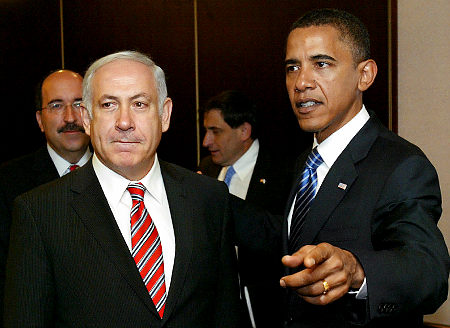Israel Analysis: What Does Obama Expect from Netanyahu? (Benn)

Haaretz's Aluf Benn asks, if US incentives get a three-month Israeli extension of the freeze on settlement construction in the West Bank, "What will happen on the 91st day?" He susggests that Washington's hope is that Prime Minister Benjamin Netanyahu refrains from war with Iran and brings the "centrist" Kadima into the ruling coalition:
Prime Minister Benjamin Netanyahu returned from his journey to the United States with an American dictate: Freeze settlements for three months, during which time speedy negotiations will be held to determine the future border between Israel and Palestine. To soften the impression that this would be seen as giving in to U.S. pressure and to make it easier to gain cabinet approval for the freeze, the dictate was padded with political and security goodies, which can be summed up as such: stealth military aircraft in exchange for an end to Netanyahu's evasive tactics.
The prime minister rejected the offer when it was made before the U.S. midterm elections, but now he understands that the game is up and he has to fall in line. He has displayed similar patterns of behavior in the past when confronted with specific demands by the Obama administration. Initially, he'd say "no" and explain that he had political difficulties, but when the Americans insisted, he'd succumb. This was the case when he accepted the "two state solution," the 10-month settlement freeze, the suspension of construction in East Jerusalem, and easing the siege on the Gaza Strip.
But now the challenge before Netanyahu is much more daunting. The F-35 fighter jets will land at the Tel Nof and Hatzerim bases in a few years, and the American proposal will make his life much more complicated.
Assuming Israel approves the proposal and the Palestinians agree to resume talks, what happens on the 91st day, after the latest settlement freeze comes to an end? Will Netanyahu submit a detailed proposal on the future borders? And what will the Americans do if the prime minister and Palestinian Authority President Mahmoud Abbas do not reach an agreement in three months? Will U.S. President Barack Obama then try to impose his own map? And if the two stick to their refusal, how will the administration respond?
The second major question the deal raises pertains to Iran. At yesterday's cabinet meeting, Netanyahu said that during every one of his meetings in the United States he raised "first and foremost the need to stop the Iranian nuclear project." The fighters the United States has promised Netanyahu are not meant to protect Israel from the Palestinians, but to bolster Israeli deterrence capabilities vis-a-vis Iran. According to intelligence assessments, however, Iran will have a nuclear weapon long before the F-35s become operational in Israel.
Did Netanyahu signal to the U.S. administration that he would avoid an attack on Iran in return for advanced fighters and the defense agreement he requested? It's hard to believe the Americans offered to provide the Israel Air Force with such advanced weapons in exchange for just a three-month settlement freeze. It's more likely that they offered to strengthen Israeli deterrence capabilities in order to prevent a war in the region.
Alternatively, does Netanyahu believe that with a settlement freeze, a resumption of negotiations and the improvement that will ensue in Israel's international standing, he will be able to strike Iran and the "world" will avoid condemnations and sanctions, while it waits for signs of Israeli generosity toward the Palestinians in the West Bank?
The third question, which is more immediate, has to do with the integrity of the coalition. To date, Netanyahu was able to obtain cabinet approval for all U.S. dictates The right wing ministers in his coalition were not enthusiastic and did not go out of their way to sell the decisions to the public, but neither did they oppose the prime minister publicly. Now the situation is different. Shas announced that it will abstain and Foreign Minister Avigdor Lieberman declared that "we will not agree to even a single day of freeze." If Lieberman votes in favor or abstains, and it does not matter what his excuse will be, he will be called a pushover. So it appears that for the first time, Netanyahu will face a divided vote on an important political issue.
But this is precisely what the Americans want: They want Netanyahu to change the composition of his coalition, bring in Kadima in place of the right wing factions and replace Lieberman with Tzipi Livni. That way the world will see that he's serious about negotiations with the Palestinians. Netanyahu has opted to date to maintain his alliance with the right, fearing that Lieberman would steal voters away from him and that Livni would try to undermine him and push him out of office. But as the 91st day approaches, it may be that he has no choice.
 Aluf Benn,
Aluf Benn,  Barack Obama,
Barack Obama,  Benjamin Netanyahu,
Benjamin Netanyahu,  Haaretz,
Haaretz,  Israel,
Israel,  Kadima,
Kadima,  Palestine
Palestine 
Reader Comments